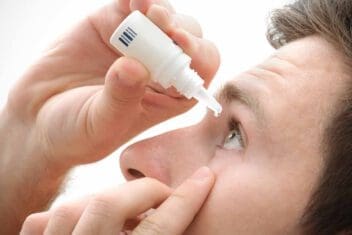Simple Home Remedies for Dry Eyes That Actually Work (& Myths)
Home / Dry Eyes: Causes, Symptoms & Treatments /
Last Updated:
Dry eye is a condition that can occur due to environmental factors or medical issues. It can lead to irritation, redness, and vision problems.
Table of Contents
It can also be a chronic syndrome, known as dry eye syndrome, that happens when your eyes don’t properly manufacture tears or maintain the necessary oil and moisture levels in your eyes to keep them lubricated properly.
More than 16 million Americans are estimated to suffer from dry eye disease.
There are numerous home remedies out there claiming to help with dry eyes. These range from artificial tear solutions to diet changes. Some of these approaches work, and some are ineffective.
These are the most popular home remedies for treating dry eyes:
- Eye drops
- Heat and massage
- Vitamin supplements
- Eyelid washes
- Environmental and lifestyle changes
For chronic and severe dry eyes, there are several medical interventions that can be explored as well.
Eye Drops

If you suffer from dry eye syndrome, one of the most common remedies is to use some form of eye drops, often in the form of artificial tears.
There are both over-the-counter and prescription medicated eye drops designed to manage dry eyes. If you suffer from chronic dry eyes because your eyes are not making enough tears on their own, this can be helpful. You may need to administer drops several times a day to keep your eyes moist.
Dry eyes are not always caused by a lack of tear production or maintenance, however. In these cases, using eye drops may offer some temporary relief, but it is not likely to be a permanent or lasting solution. Oftentimes, dry eyes are actually the result of a lack of oil production, and eye drops do not increase the level of necessary oils in your eyes.
Eye drops often contain preservatives that can further irritate your eyes. There are single-use eye drops that are preservative-free and come in small one-dose vials.
Ointments are also available that can be placed into your eyes to coat them and provide a longer-lasting moisture seal than eye drops can. Ointments are thicker and can therefore blur your vision. It is typically recommended to only use them at night.
Heat & Massage
Blocked tear ducts can lead to issues like dry eyes. A well-known home remedy for this is to apply a warm compress or washcloth on the eyes for several minutes a few times a day. This helps to loosen debris and unclog your tear ducts to release the natural oils.
It’s also recommended to gently press down and massage the corners of your eyes with the compress. While warm compresses and gentle massage can provide temporary relief and feel good, they may not actually help with your dry eyes.
You deserve clear vision. We can help.
With 135+ locations and over 2.5 million procedures performed, our board-certified eye surgeons deliver results you can trust. Your journey to better vision starts here.
If your dry eyes are the result of meibomian gland dysfunction (MGD), for instance, massage and warm compresses aren’t enough to stimulate oil production or clear out your tear ducts.
There are some in-office medical procedures that apply heat directly to the source of the problem. These approaches can break up waxy deposits in your tear ducts to improve dry eyes resulting from MGD.
Vitamin Supplements
Eating a healthy and balanced diet aids in whole body wellness, which includes your eyes.
Omega-3 fatty acids are found in foods like fish and flax seeds, and they can also be taken in supplement form. The health benefits of omega-3 fatty acids can potentially reduce symptoms of dry eyes when taken in conjunction with a balanced diet and healthy lifestyle.
Vitamin A and D deficiencies may contribute to dry eyes. Taking vitamin A and D supplements may therefore improve symptoms. More research is needed to confirm this link, however.
Consult with a health care professional before adding supplements to your regime or drastically changing your diet.
Eyelid Wash
Another common natural treatment for dry eyes is to use mild or baby shampoo to wash your eyelids and eyelashes. There are also over-the-counter eyelid and eyelash washes to clean these areas.
This can help to keep your eyes cleaner and remove crust from your eyelids and eyelashes. The practice may reduce inflammation. However, it is not likely to cure your dry eyes.
Frequent eye washing can be a great form of preventative medicine though, helping to keep your eyes clean and functioning properly. Eye washes can keep your tear ducts and eyelids from getting blocked as easily. If this is what is causing your dry eyes, these washes can be a home remedy to treat the issue.
You deserve clear vision. We can help.
With 135+ locations and over 2.5 million procedures performed, our board-certified eye surgeons deliver results you can trust. Your journey to better vision starts here.
Environmental Changes

Dry eyes can be triggered by many different things. Understanding the root cause of your dry eyes can help you to manage and treat them. It can be as simple as changing some of the things in your environment, for example.
These are some things you can do to minimize dry eyes that are related to your environment and lifestyle:
- Limit your screen time. The more time you spend staring at a screen or in the digital world, the more you can dry out your eyes. If you work on a computer, take frequent breaks to rest your eyes. Look away from the screen at least every 20 minutes.
- Use a humidifier or filter. Dry air can dry out your eyes. By introducing moisture into the air and purifying it, you can keep your eyes from getting as irritated and dry.
- Drink plenty of water. The more hydrated you are, the more moisture will be in your body. This translates to more moisture content in your eyes as well
- Limit exposure to forced air and cigarette smoke. Fans, air-conditioning units, hair dryers, heaters, and cigarette smoke can all be eye irritants that can cause dry eyes.
- Protect your eyes from the sun and wind. UV light can lead to dry eyes. Wearing sunglasses, especially wraparound sunglasses, in windy and sunny conditions, can help.
- Change your contacts frequently, and use lenses formulated for dry eyes. Wearing your contacts too long, not cleaning them properly, or not wearing the right contacts for your eyes can all contribute to dry eyes. It can also help to give your eyes a break by wearing glasses for a few days.
- Blink often. Your eyes dry out as you hold them open for long periods of time. Frequent blinking can increase tear production and keep them from getting too dry.
Medical Remedies for Dry Eyes
When looking for a treatment for dry eyes — whether a home or natural remedy or a medical intervention — the first thing to consider is what is causing the condition. If your dry eyes are the result of a medical condition or medication, you likely need a medical intervention to manage the issue. The root cause of dry eyes needs to be understood in order to ensure that the treatment will fit the cause.
There are several procedures that can be performed to manage and even potentially cure dry eyes permanently.
- Eyelid surgery: This can be necessary if your dry eye syndrome is caused by an inability to blink properly.
- Surgical plugging of tear ducts: This procedure can keep your tears on the surface of your eyes for longer. This can help to manage the moisture content of your eyes if your dry eyes are caused by the ducts draining your tears too quickly.
- Specialized contacts: Several manufacturers design contacts specifically to help with dry eyes. These range from scleral lenses that are larger and vault over the cornea to silicone hydrogels and other soft contact lenses with specific moisture content levels.
- Thermal pulsation: This is an in-office procedure to break up wax and unclog oil glands in your eyes.
- Medications: If you suffer from chronic dry eyes that are the result of inflammation, infection, or another medical condition, treatment of the underlying issue is necessary to manage your dry eyes.
Tips to Prevent Dry Eyes
Whether you suffer from occasional dry eyes or ongoing dry eye syndrome, there are certain steps you can take to lessen the intensity and frequency of dry eyes.
- Take breaks when performing up-close tasks. Look away every 20 minutes for at least 20 seconds.
- Avoid smoke and other eye irritants.
- Wear sunglasses when outside to avoid wind blowing in your eyes.
- Use a humidifier at home to keep the air moist.
- Apply artificial tears as needed.
Discuss all potential eye-related issues with your eye care provider to ensure that your dry eyes are being managed optimally.
In many cases, you can combine natural and medical remedies to keep your eyes clean and functioning as best as possible. Your doctor can help you to develop an eye care plan to manage your dry eyes.
You deserve clear vision. We can help.
With 135+ locations and over 2.5 million procedures performed, our board-certified eye surgeons deliver results you can trust. Your journey to better vision starts here.
References
- New Study Focuses on Scope of Dry Eye Disease in U.S. (August 2017). American Optometric Association.
- Meibomian Gland Disease: The Role of Gland Dysfunction in Dry Eye Disease. (November 2017). Ophthalmology.
- Omega-3 Essential Fatty Acids Therapy for Dry Eye Syndrome: A Meta-Analysis of Randomized Controlled Studies. (2014). Medical Science Monitor.
- A Holistic Approach to Treating Dry Eyes. (December 2018). Natural Medicine Journal.
- Modern Approach to the Treatment of Dry Eye, A Complex Multifactorial Disease: A P.I.C.A.S.S.O. Board Review. (July 2020). British Journal of Ophthalmology.
- A Comprehensive Review on Dry Eye Disease: Diagnosis, Medical Management, Recent Developments, and Future Challenges. (January 2015). Advances in Pharmaceutics.
- Dry Eye Disease: Let’s Start Thinking Outside of the Artificial Tear Box. (July 2017). Ophthalmology.
- Definition and Diagnostic Criteria of Dry Eye Disease: Historical Overview and Future Directions. (November 2018). Investigative Ophthalmology & Visual Science.
This content is for informational purposes only. It may have been reviewed by a licensed physician, but is not intended to serve as a substitute for professional medical advice. Always consult your healthcare provider with any health concerns. For more, read our Privacy Policy and Editorial Policy.